The car rental industry is a vital part of the transportation sector, meeting the mobility needs of individuals and businesses through short-term rentals. With major global companies and local providers, the industry has experienced significant growth influenced by consumer demand, economic conditions, technology advancements, and environmental concerns. This article explores how this system works, and its general features and compares major players in the market.
What is a car rental reservation system?
A car rental reservation system (CRSS) is an online or offline software tool that allows customers to book rental vehicles and make reservations. These systems often include features like:
- Search: Customers can search for cars available for rental at a specific location and date.
- Pricing: Customers can see the rates for different types of cars and rental periods.
- Booking: Customers can book a car by providing their contact information and payment details.
- Confirmation: Customers receive a confirmation email with details of their reservation.
When renting a car in advance, customers visit a rental website or app, choose a vehicle, and make a reservation with payment if necessary. On the scheduled day, they pick up the car at the rental location after verification and explanation of terms by an agent. Upon return, the car is inspected.
Automating these processes enhances service quality. Let's explore how each CRRS module contributes to this.
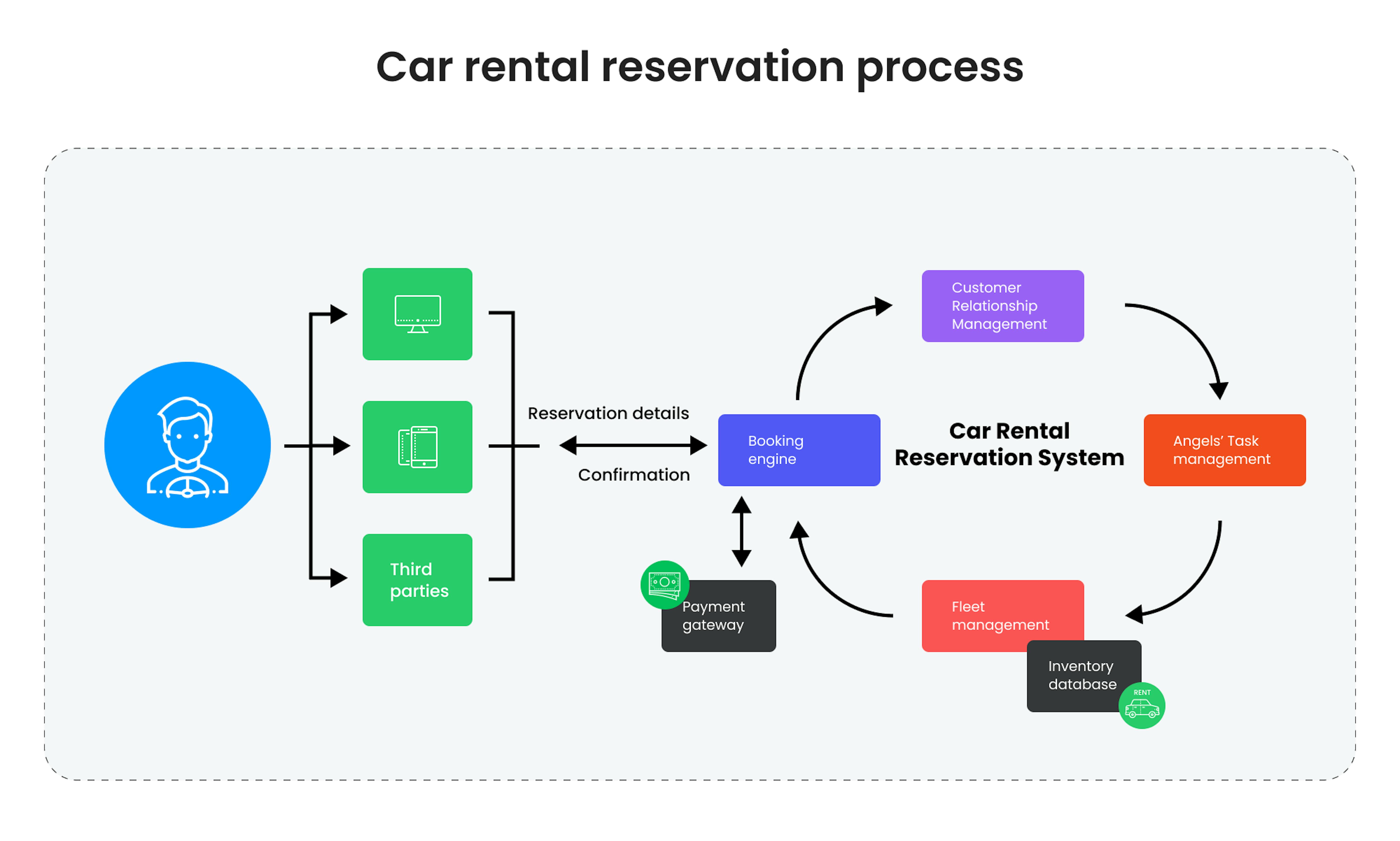
Car rental booking engine
The booking engine plays a central role in the car rental reservation system, seamlessly connecting with the inventory database to provide real-time information on car availability, associated accessories, and pricing. Moreover, this module often carries out the following functionalities.
Payment operations involve integration with a payment gateway like PayPal, Braintree, or Stripe. The booking engine facilitates online payments, generates electronic invoices, monitors pending payments, calculates rental costs, and generates financial reports.
In order to ensure a smooth booking process, the following tasks are performed by the engine:
- Transfers reservation details to the fleet management module,
- Inputs customer information into the Customer Relationship Management module,
- Notifies the Task Management module to ensure timely car preparation, and
- Sends the customer a confirmation of their reservation.
Bookings can come from various sources, including Global Distribution Systems (GDSs), Online Travel Agencies (OTAs), and travel consolidators. They integrate with the booking engine to access and distribute car rental itineraries. The booking engine calculates and assigns referral rates to these channels.
Management and oversight of a vehicle fleet
Fleet management involves various aspects such as vehicle tracking, distribution to customers, and monitoring the condition of cars, including their repair and damage history. Here we will provide general information about fleet management.
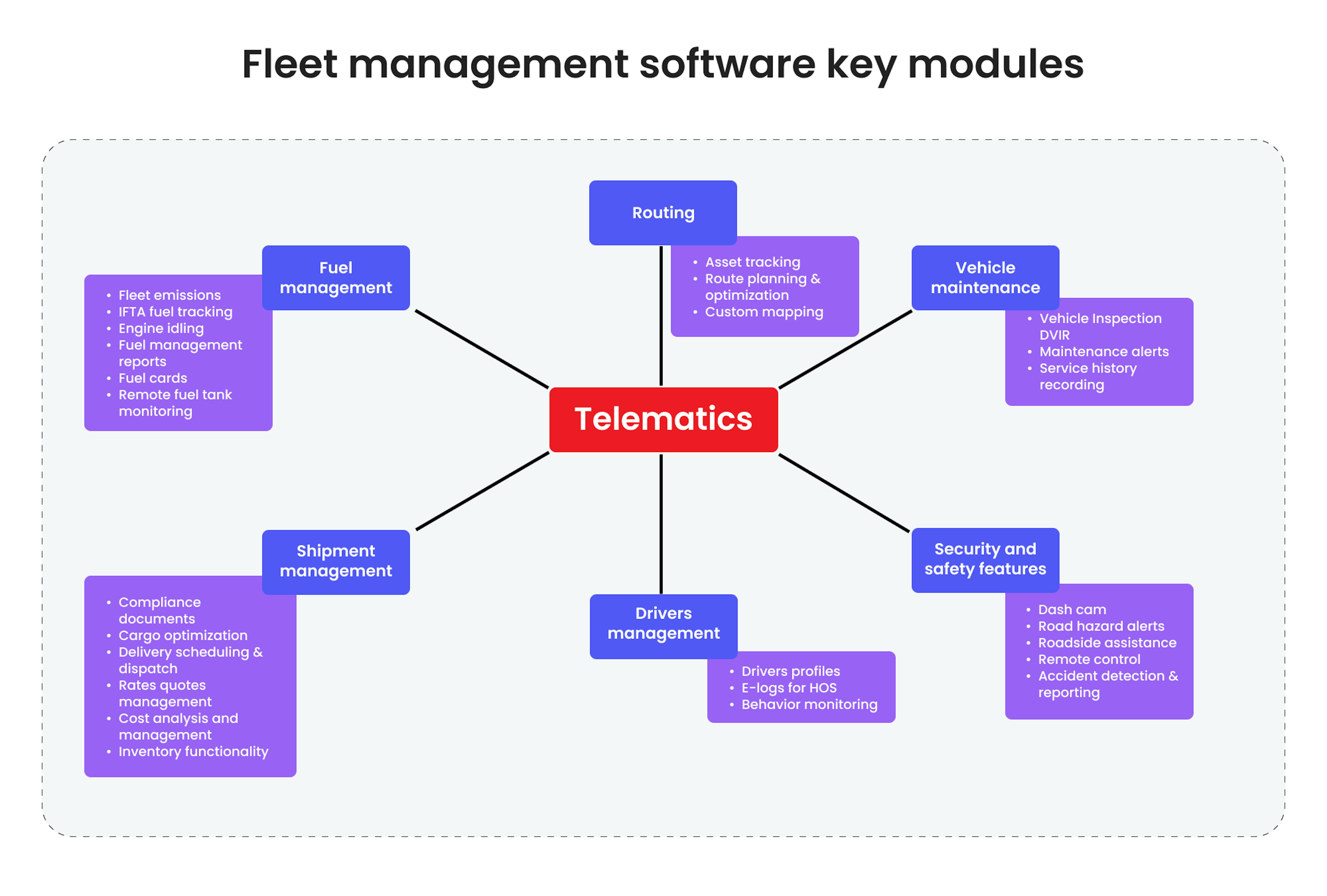
Telematics and remote monitoring play a crucial role in car rental operations. Due to unpredictable rental inventory, it is essential to monitor vehicles. Telematics integrates car devices that utilize GPS and onboard diagnostics to collect and transmit vital information like location, mileage, fuel consumption, speed, and temperature. Integrating telematics into the car rental software lets you track your cars in real-time and review routing details.
For our customer from GoDee, we implemented the Trips Monitor feature. It allows operators to track buses in real time and collect data on late and early arrivals. If necessary, the operator can quickly contact passengers or drivers.
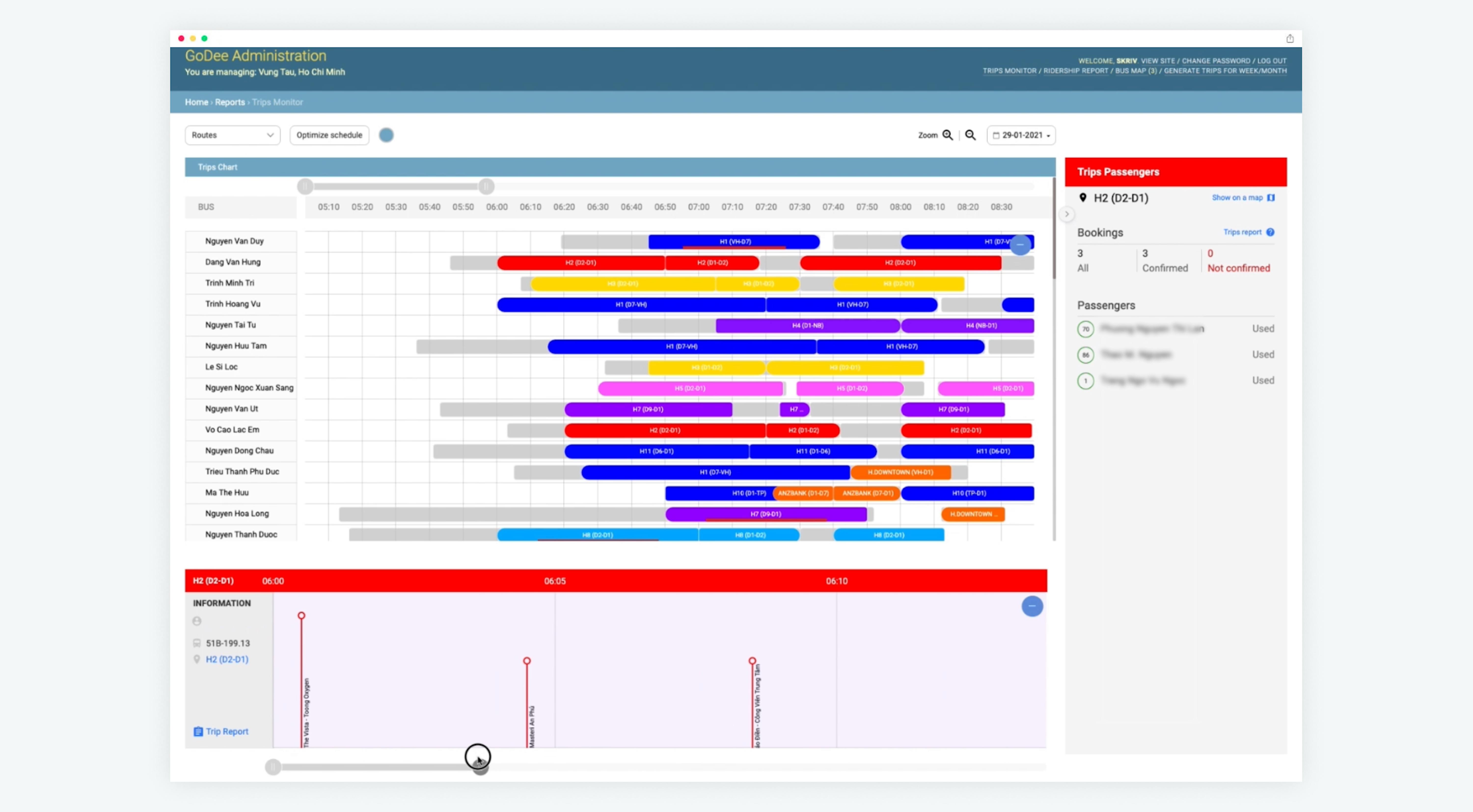
If you want to develop or upgrade the existing car rental reservation system, contact us, and we will answer all your questions, help you draw up a development plan, or create a project from scratch.
Maintaining a comprehensive car history allows us to track all maintenance tasks performed on the vehicle. It ensures the car's condition is documented before customer delivery, facilitating easier before-and-after inspections. The system generates asset condition reports with visual evidence, such as pictures and videos, reducing the likelihood of damage disputes.
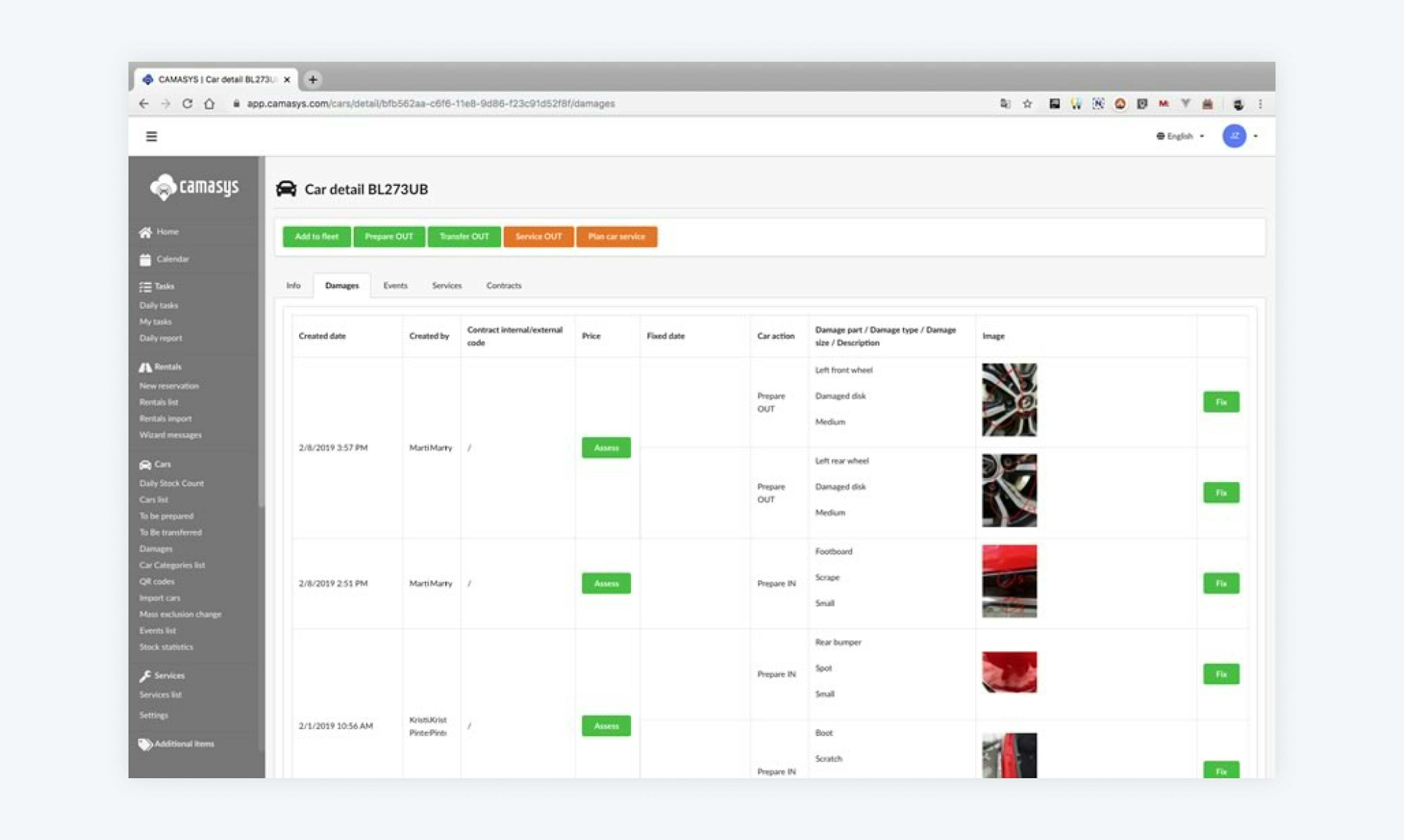
Efficient allocation of rental cars ensures optimal fleet utilization. The system monitors vehicle usage, evenly distributing the workload and preventing the use of worn-out assets. It automatically assigns an alternative available vehicle for confirmed reservations if any issues arise. Moreover, by tracking the workload of each purchase, the system can establish reservation limits to prevent exceeding the number of available cars.
Using visual tools to manage the fleet efficiently. The fleet chart offers a comprehensive view of car occupancy, assessing vehicle availability and optimizing the fleet for upcoming days. Additionally, the system visually presents the availability of additional equipment like GPS and child seats.
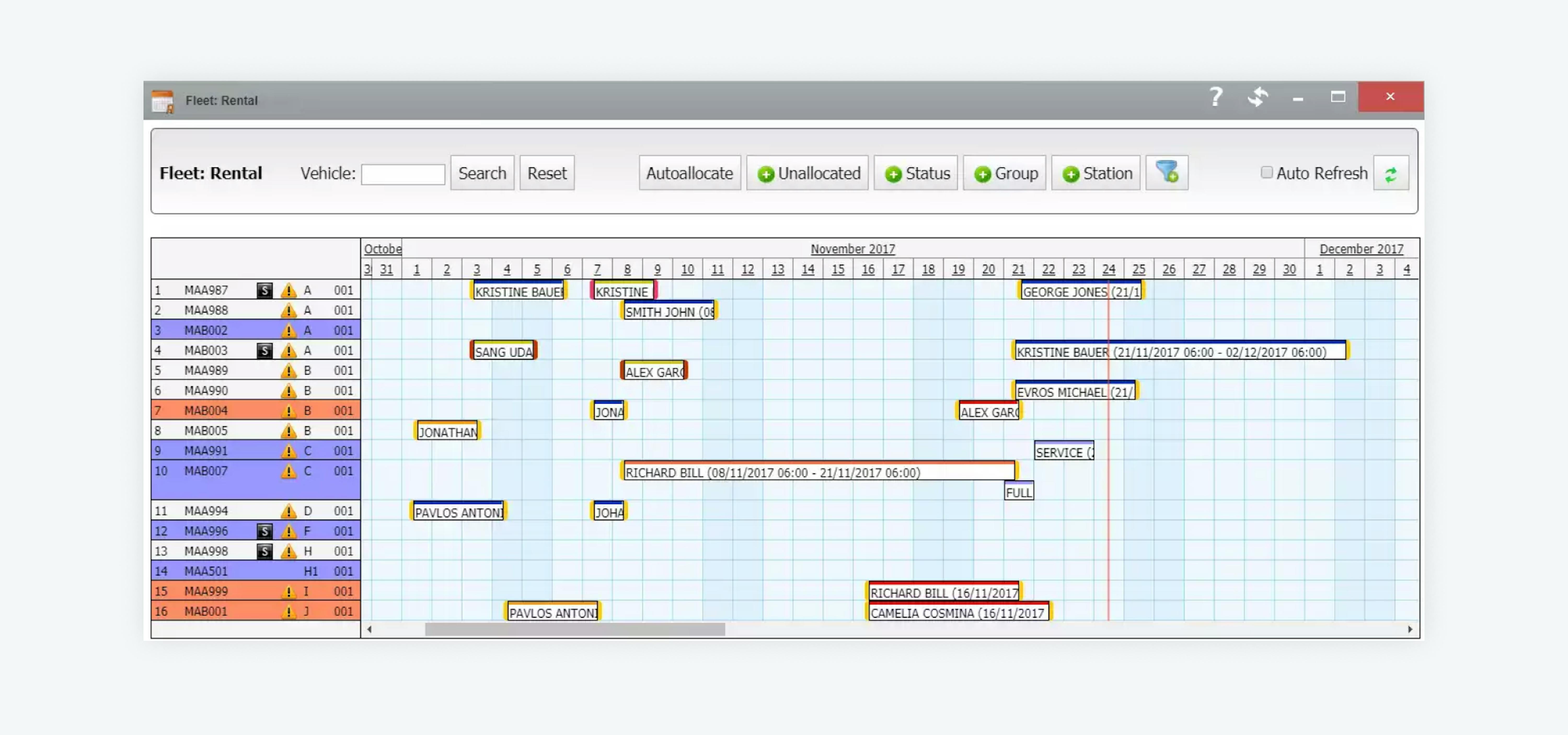
Rental car companies have different approaches to overbooking. Some choose to overbook, while others prefer to avoid it. The decision depends on the accurate estimation of future reservation requests. In case of overbooking, the system assigns a backup vehicle from a similar group. It efficiently manages adjustments between locations, reservations, and contracts.
Data is consistently collected by the system and generates real-time customized reports. These reports provide insights into rental revenue, expenses, and fleet profitability. You can analyze the occupancy rates and locations of the cars to generate statistics for future planning and decision-making.
Management of tasks by car rental agents
Car rental agents can enhance efficiency by utilizing an RRS to streamline tasks. With the task management module, agents can automate role assignments and seamlessly manage their responsibilities, allowing for smoother operations and potential business automation.
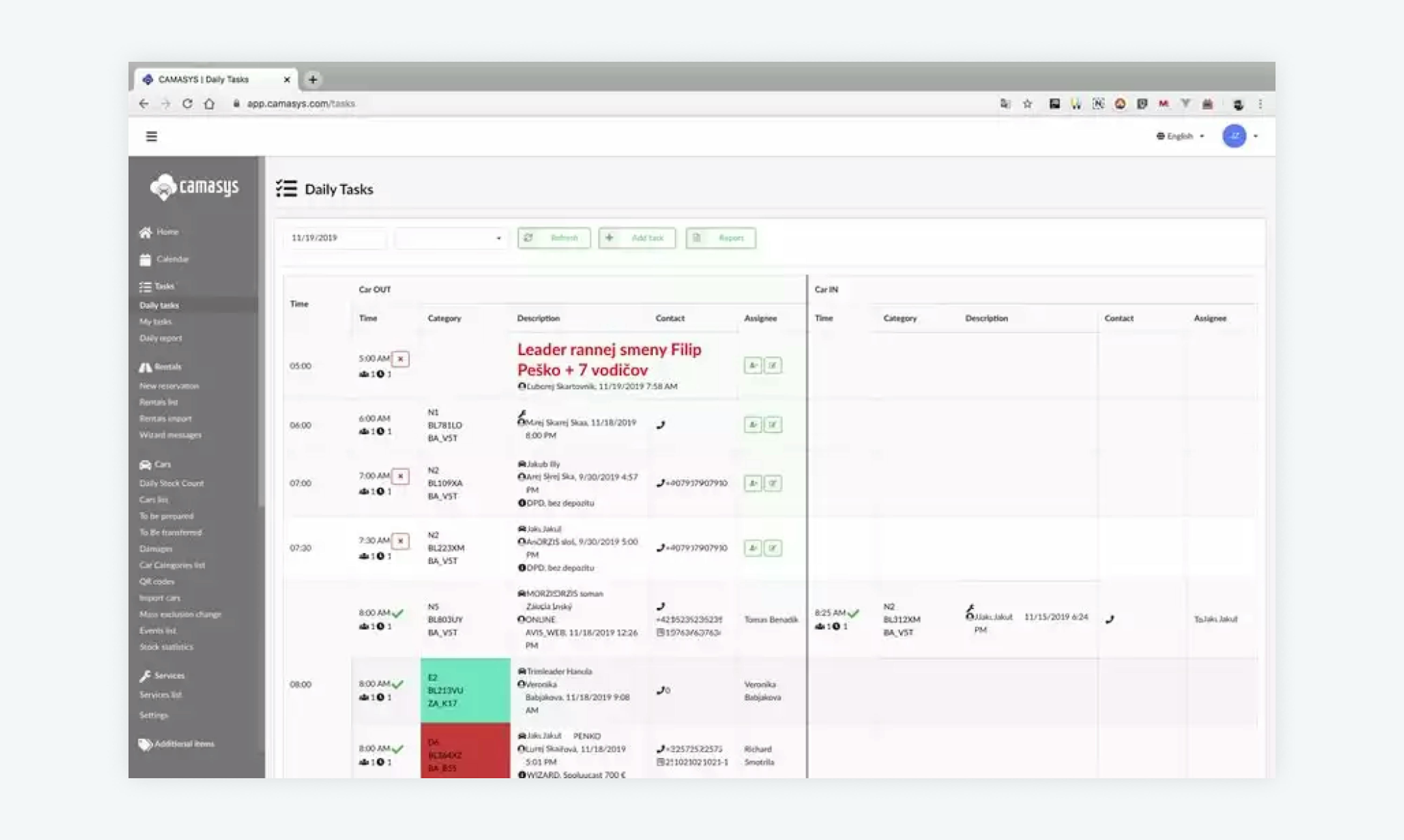
For example, in GoDee, we used Pifa. It is a microservice from Mad Devs that optimizes ETA (estimated arrival time) using detailed drivers' performance data in GoDee. One-click shows more accurate arrival and departure times with Pifia. In the article by Oleg Puzanov, Mad Devs CSO, you can learn more about how we predict routes in GoDee using Prim's algorithm.
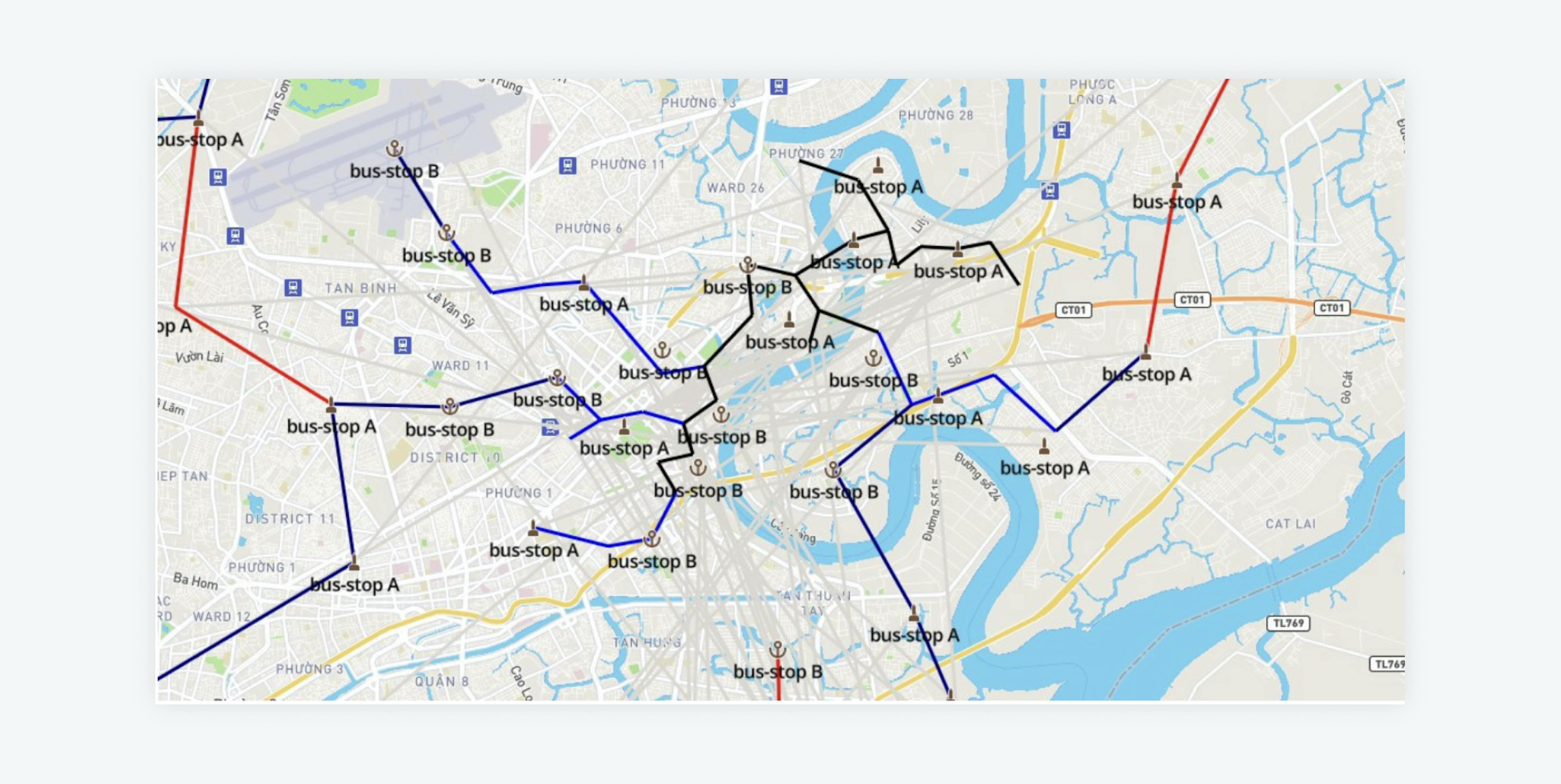
Another feature is when agents can anticipate upcoming vehicle returns and proactively initiate necessary preparations.
Additionally, the system provides automated reminders for various tasks, including car maintenance, oil changes, and annual vehicle tests such as the Ministry of Transport (MOT) test in the UK.
Besides, with the ability to scan a driver's license, the system can automatically populate the customer form with the client's details.
Customer relationship management
The car rental system includes a CRM that stores customer history and statistics, sending them notifications. It facilitates satisfaction campaigns by distributing evaluation forms to clients and automatically following up on customer complaints.
CRM sends notifications to customers to keep them informed about the status of their booking, including essential details such as required documents, fees, and receipts. These automated emails are triggered by the software's events at different stages of the car rental process.
Measuring customer satisfaction is essential for identifying and resolving bottlenecks in the car rental process. You can effectively detect and solve issues by understanding customer behavior, addressing negative reviews, and improving retention. Custom questionnaires in the software help gather valuable insights for comprehensive analyses.
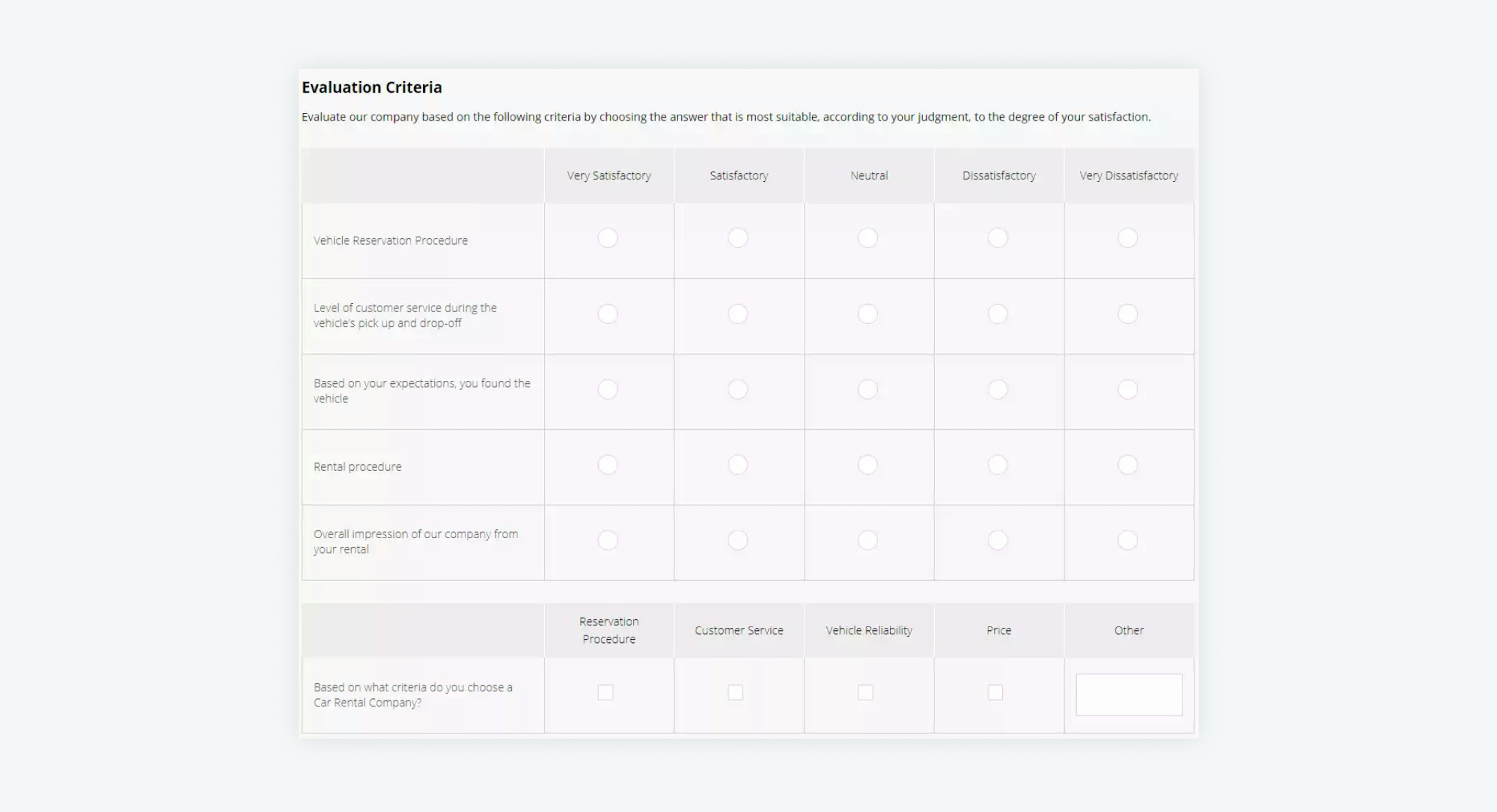
Importance of an efficient reservation system
The importance of an advanced system in the car rental industry cannot be overstated. A well-designed and streamlined reservation system offers numerous benefits for customers and car rental companies.
Benefits for customers:
- Convenience and ease of use.
- Browse available vehicles, and compare prices.
- Quick and secure reservations.
- A user-friendly interface and intuitive booking process.
From the perspective of car rental companies, an easy-to-use reservation system improves operational efficiency and reduces administrative tasks. It automates the booking process, minimizing errors and manual interventions. This leads to faster turnaround times, optimized resource allocation, and improved fleet management. Additionally, an integrated reservation system can provide valuable insights and data analytics, enabling companies to make informed decisions regarding pricing, inventory management, and customer preferences.
In addition to boosting revenue, an effective reservation system optimizes utilization rates. Companies can better plan and allocate their vehicles by allowing customers to book in advance, ensuring higher utilization. In addition, with dynamic pricing capabilities, companies can optimize their fares based on demand, maximizing their revenue potential.
In summary, a well-functioning car rental operation relies heavily on an effective reservation system. It improves the customer experience, streamlines internal processes and promotes business growth. By investing in a robust reservation system, car rental companies can gain a competitive advantage and provide exceptional service in a fast-paced industry.
How to improve existing systems
Until now, our focus has been on car rental companies that manage their fleet. However, what if you need to handle bookings for vehicles not directly part of your inventory? In the following sections, we will explore integration possibilities and introduce a subsidiaries management module specifically designed for businesses overseeing multiple car rental brands.
Supplier integration allows customers to conveniently browse and reserve available vehicles through channels such as OTAs, tour operators, or car rental marketplaces linked to the suppliers' booking engines. If you are already involved in the car rental industry and want to broaden your services, many avenues are available to do this expansion.
Integrating car rental inventory is possible through Application Programming Interfaces (APIs). It offers benefits like seamless connectivity with external systems, real-time access to inventory data, and automated processes. It enhances reservation management, reduces manual tasks, and enables the incorporation of value-added services.
Opting for a booking engine with pre-integrated suppliers saves time and effort compared to integrating APIs individually. Mad Devs offers a comprehensive service that includes project discovery, developing team consulting, and customized solutions if you are looking for a dedicated team.
Iframe integration allows you to embed the supplier's booking engine within your website by inserting their code. This enables you to provide car rental search functionality without the ability to make bookings, serving as a dedicated search engine for car rentals.
Effective collaboration and reporting tools are necessary for managing multiple local car rental brands. These tools help track car availability, rental activity, and sales reports across subsidiaries, ensuring seamless coordination and a comprehensive overview of operations at different locations.
A real-time ETA is a good feature for approximate late/early departures. A car rental reservation system is a valuable tool that benefits both customers and car rental companies. In the case of GoDee, ETA in real time was one of the success factors. With accurate ETAs, GoDee could reduce wait times and improve the customer experience. By improving efficiency and reducing wait times, real-time ETA enhances the overall customer experience. If you need to implement this feature and others in your product and are looking for a team of professionals, please contact us.
Global car rental market size in 2023
The global car rental market is expected to reach $180.75 billion by 2028, growing at a CAGR of 9.87% from 2023 to 2028. Several factors are driving this growth, including:
- The expansion of the travel and tourism industry
- The increasing urban population's interest in adventure and travel
- The convenience of online booking platforms and smartphone applications
- Rising consumer spending power
In 2022, the global car rental market was valued at USD 103.79 billion and is projected to reach USD 180.75 billion by 2028, with a CAGR of 9.87% during 2023-2028.
Economy cars dominate the market due to their compact size, fuel efficiency, and lower costs. The business segment leads the market, but the expanding tourism industry is expected to drive growth in tourist car rental services. Online bookings are popular, providing a diverse selection of vehicles and round-the-clock availability.
If we are talking about regions, North America has the largest car rental industry, followed by Asia Pacific, Europe, South America, the Middle East, and Africa. Adopting car rental software and low-cost rentals contribute to North America's success, while the Asia Pacific region benefits from growing urbanization and population.
Another factor that strongly influenced the development of the market was COVID-19. The pandemic significantly impacted the car rental market, with reduced air travel affecting demand for airport rentals. Car rental companies have implemented hygiene and safety measures like vehicle disinfection to ensure customer safety. Market players like Hertz and Avis have sold off older vehicles to generate revenue during the pandemic.
For example, recent developments:
- Sixt SE has introduced a mobile app that enables company car drivers to manage their contracts conveniently. Starting from March 2021, Hertz will implement an annual membership fee for its 24/7 service, allowing members to rent cars and vans without physical contact.
- In February 2021, Humax announced the enhancement of their WTC Auto Rent RAiDEA mobility service platform, specifically tailored for cars, electric scooters, bikes, motorcycles, and cars in the Middle East region. The improvements aim to provide a seamless experience for round trips, free-floating rentals, and one-way rentals.
- In December 2021, Ajman Public Transport Authority (APTA) in the UAE introduced vehicle rental services to support federal institutions in establishing a comprehensive and equitable transportation system as part of the Emirate's Vision 2021. This initiative aims to enhance service quality and accessibility for clients. The Transport Authority's Vehicle Rental Section developed premium vehicle rental services.
Who are the major players in the market
The car rental industry is highly competitive and comprises several major players who dominate the market. Some of the leading companies in the car rental industry include:
- Enterprise holdings. As one of the largest car rental companies globally, Enterprise Holdings operates three major brands: Enterprise Rent-A-Car, National Car Rental, and Alamo Rent-A-Car. They have a strong presence in the United States and worldwide.
- The Hertz corporation. Hertz is a well-known name in the car rental industry, offering rental services in over 150 countries. They cater to both leisure and business travelers and have a wide range of vehicles.
- Avis Budget Group. Avis and Budget are two prominent brands operated by the Avis Budget Group. They offer car rental services in various locations worldwide, providing options for both short-term and long-term rentals.
- Europcar Mobility Group. Europcar is a leading car rental company with a significant presence in Europe and other parts of the world. They offer various vehicles, including cars, vans, and luxury vehicles to meet customer needs.
- Sixt SE. Sixt is a global mobility services provider known for its premium car rental services. They operate in over 100 countries and offer many vehicles, including luxury and sports cars.
- Lyft and Uber. While not traditional car rental companies, ride-hailing services like Lyft and Uber have disrupted the market by providing on-demand transportation services through their mobile apps. These companies offer an alternative to traditional car rental for shorter trips and transportation needs.
These major players have established their presence through extensive networks, strong brand recognition, and a wide range of services. Nevertheless, it's important to note that the car rental industry is dynamic, and regional players and new entrants also contribute to the market's competitiveness.
What are the future trends and innovations
The car rental industry is constantly evolving, and several future trends and innovations are expected to shape its landscape. Advancements in technology, such as the integration of AI and IoT, will enhance the overall customer experience and streamline operations. For example, the growing demand for electric and autonomous vehicles is likely to drive the adoption of sustainable and self-driving options in car rental services. Future trends and innovations in the car rental industry include:
- Electric and hybrid vehicles. As the world moves towards sustainability, there will be a greater focus on electric and hybrid vehicles in the car rental industry. Rental companies will invest in expanding their fleets with eco-friendly options to meet the growing demand for sustainable transportation.
- Autonomous vehicles. The development and adoption of autonomous vehicles will revolutionize the car rental industry. Self-driving cars will provide convenient and efficient transportation options, offering customers a new level of convenience and flexibility.
- Mobility as a Service (MaaS). MaaS is a concept that integrates various modes of transportation, including car rentals, public transit, ride-sharing, and more, into a unified platform. Rent-a-car companies will collaborate with other mobility providers to offer customers seamless and integrated travel experiences.
- Mobile apps and digital platforms. Car rental companies will continue to invest in mobile apps and digital platforms to enhance the customer experience. These platforms will enable customers to easily book, manage, and track their rentals, access additional services, and provide feedback.
- Personalization and customization. The rental car industry will focus on providing personalized experiences to meet individual customer preferences. This includes offering tailored vehicle options, flexible rental durations, and customized add-on services.
- Data Analytics and Artificial Intelligence (AI). Data analytics and AI will enable car rental companies to analyze customer behavior, optimize fleet management, improve operational efficiency, and enhance overall customer satisfaction.
- Contactless services. The COVID-19 pandemic has accelerated the adoption of contactless services in the car rental industry. Companies will continue prioritizing contactless booking, pickup, and return processes and implementing enhanced cleaning and sanitization protocols.
These trends and innovations will shape the future of the car rental industry, providing customers with enhanced convenience, sustainability, and personalized experiences.
Conclusion
Overall, a car rental reservation system can be a valuable tool for any car rental company. It can help to improve efficiency, customer service, and revenue. If you are considering using a car rental reservation system, compare prices and features before deciding.
Having gained insights into the crucial aspects of creating a car rental website, you are equipped with valuable knowledge to outperform your competitors and establish yourself as an industry leader. Implementing the tips shared in this article will pave the way for your success in the car rental business.
If you're seeking guidance on building a car reservation system or are unsure where to begin, we're here to assist. Contact us, and our team will be delighted to assist you in creating a car rental website that your users will adore.












